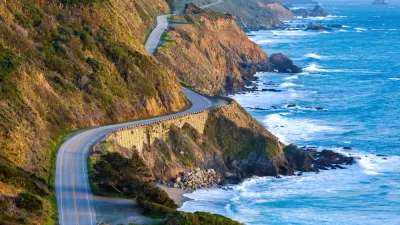A New York federal district court rules on a climate change lawsuit like its West Coast counterpart did last month: Don't hold oil companies accountable for climate change and sea level rise. Baltimore and Rhode Island file climate change lawsuits.

"A federal judge on [July 19] dismissed New York City's lawsuit against five of the world's largest oil companies, dealing a setback to local governments that are trying to hold the fossil fuel industry accountable for climate change," report Nicholas Kusnetz and David Hasemyer for InsideClimate News
Southern District Court Judge John F. Keenan, in dismissing the case, said the courts were not the right venue for such a claim.
"Climate change is a fact of life," Keenan wrote, adding that that fact was not contested by the fossil fuel companies named in the suit. But he said global warming should be solved by Congress and the president—not by the courts.
A spokesperson for Mayor Bill de Blasio indicated that the city would appeal the decision.
The ruling is remarkably similar to the outcome of two lawsuits on June 25 filed by the cities of San Francisco and Oakland in September 2017.
"Judge William Alsup of Federal District Court in San Francisco said the world had benefited from fossil fuels and held that the courts were not the proper venue to balance those benefits against global warming concerns," reported John Schwartz for The New York Times on June 25.
Court jurisdiction may prove critical
"All three of the dismissed cases...were either filed in federal court or had been moved to federal court at the request of the fossil fuel industry," observe Kusnetz and Hasemyer. "In each, the industry successfully argued that federal laws, primarily the Clean Air Act, take precedence over state laws.
Would state courts prove more sympathetic?
"Alsup's ruling put the other cases in the spotlight, especially those before California state courts, where the law is friendlier to municipal plaintiffs," reported Hasemyer on June 26 on the outcome to San Francisco and Oakland climate lawsuits. He's referring to lawsuits filed In July 2017 by the Bay Area counties of Marin and San Mateo and the city of Imperial Beach in San Diego County, using public nuisance laws, against oil companies, making them accountable for the impacts of climate change, including sea level rise.
Hasemyer reported on March 20 when these lawsuits were separated from the San Francisco and Oakland suits, away from Alsup's courtroom, and to state courts.
Hearing the cases in state court gives the cities and counties an edge because California has a stronger public nuisance law than the federal court system, legal experts say.
This is the best possible venue you could hope for to seek damages for sea level rise," Pat Parenteau, a professor of environmental law at the Vermont Law School, said. "You would want to get this kind of case before a local judge and jury in California."
Hasemyer goes on to explain why U.S. District Court Judge Vincent Chhabria disagreed with Judge Alsup in deciding that "California state courts were the appropriate setting for the climate lawsuits brought by San Mateo and Marin counties and the City of Imperial Beach."
Similar lawsuits filed by Santa Cruz County and the cities of Santa Cruz and Richmond also are pending a ruling by Chhabria over the appropriate legal venue.
The Santa Cruz lawsuits, originally filed in Santa Cruz County Superior Court in Dec. 20, 2017, "seek to recoup not only the costs of rising seas but of other climate-related events, including big storms, wildfires and drought," reported Kurtis Alexander for the San Francisco Chronicle.
Rhode Island
Rhode Island became the first state to join the climate change lawsuit battles when it filed a lawsuit [pdf] on July 2 in Providence/Bristol County Superior Court against 14 oil and gas companies, "saying they created conditions that constitute a public nuisance under state law and failed to warn the public and regulators of a risk they were well aware of," reported Kusnetz for InsideClimate News and the Boston Globe.
Standing atop a seawall in Narragansett, state Attorney General Peter F. Kilmartin compared the case to the lawsuits filed decades ago against tobacco companies and said it would hold the companies—including ExxonMobil, Chevron, BP and Royal Dutch Shell—accountable for harm they have caused.
"Shell Oil, in a statement, said, 'lawsuits that masquerade as climate action and impede the collaboration needed for meaningful change' were not the answer to climate change," reported Reuters on July 2.
Alex Kuffner, energy and environment writer for the Providence Journal, reports on July 21 that Shell Oil seeks to move the jurisdiction to federal court, which was anticipated by Kilmartin, who has 30 days to act on Shell's request. His office should prepare a strong argument to oppose the move based on the recent outcomes of San Francisco, Oakland and New York City climate change lawsuits against fossil fuel companies in federal courts.
Baltimore
Hasemyer and Kusnetz report that Baltimore Solicitor Andre M. Davis filed a 130-page lawsuit [pdf] on behalf of Mayor Catherine E. Pugh and the City Council in the Circuit Court for Baltimore City against 26 fossil fuel companies on July 20.
Baltimore is seeking compensation for protecting the city from the impacts of climate change, as well as punitive damages and an order that the companies relinquish some of their profits for allegedly misleading the public and policymakers about the harms posed by their products
FULL STORY: Judge Dismisses New York City Climate Lawsuit Against 5 Oil Giants

Study: Maui’s Plan to Convert Vacation Rentals to Long-Term Housing Could Cause Nearly $1 Billion Economic Loss
The plan would reduce visitor accommodation by 25,% resulting in 1,900 jobs lost.

North Texas Transit Leaders Tout Benefits of TOD for Growing Region
At a summit focused on transit-oriented development, policymakers discussed how North Texas’ expanded light rail system can serve as a tool for economic growth.

Why Should We Subsidize Public Transportation?
Many public transit agencies face financial stress due to rising costs, declining fare revenue, and declining subsidies. Transit advocates must provide a strong business case for increasing public transit funding.

How Community Science Connects People, Parks, and Biodiversity
Community science engages people of all backgrounds in documenting local biodiversity, strengthening connections to nature, and contributing to global efforts like the City Nature Challenge to build a more inclusive and resilient future.

Alabama: Trump Terminates Settlements for Black Communities Harmed By Raw Sewage
Trump deemed the landmark civil rights agreement “illegal DEI and environmental justice policy.”

Dear Tesla Driver: “It’s not You, It’s Him.”
Amidst a booming bumper sticker industry, one writer offers solace to those asking, “Does this car make me look fascist?”
Urban Design for Planners 1: Software Tools
This six-course series explores essential urban design concepts using open source software and equips planners with the tools they need to participate fully in the urban design process.
Planning for Universal Design
Learn the tools for implementing Universal Design in planning regulations.
City of Santa Clarita
Ascent Environmental
Institute for Housing and Urban Development Studies (IHS)
City of Grandview
Harvard GSD Executive Education
Toledo-Lucas County Plan Commissions
Salt Lake City
NYU Wagner Graduate School of Public Service





























